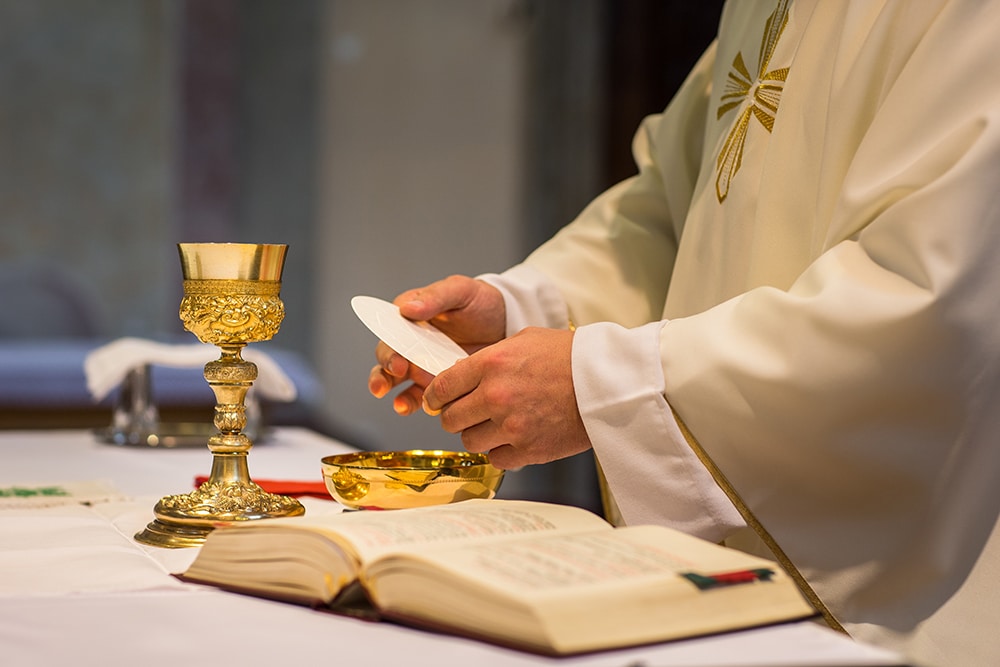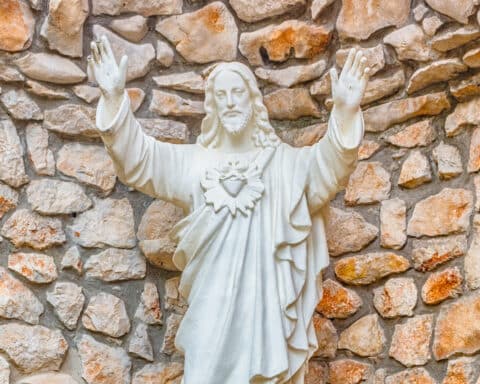
We have not been abandoned. God dwells among us.
And yet, the cult or worship of the sacramental life, especially the Eucharist, is integral to Catholic life. Plunged into the saving waters of salvation, anointed with the oil of sanctity, we are called to eat and drink Christ’s body and blood in the Eucharist.
This is no normal eating and drinking. For in this sacrament, it is Christ who comes to consume us. We belong to him, all of us, one body in Christ.
The cultic dimension of Christian life is underlined in 1 Peter. Jesus is the living stone, rejected by all.
Yet, through the eyes of God, this stone was recognized for what it was — the foundation of a spiritual temple, a gathering of all the nations made to worship God.
| May 10 – Fifth Sunday of Easter |
|---|
|
Acts 6:1-7
Ps 33:1-2, 4-5, 18-19
1 Pt 2:4-9
Jn 14:1-12
|
The First Epistle of Peter, though, doesn’t stop there. It is the Christian people that are to become a living temple. We are spiritual priests, made to sanctify the world, offering up our very lives in a sacrifice of praise to the glory of God. Just as an ordinary stone becomes consecrated to God, so our human flesh has been sanctified, dedicated to a holy task.
In this sense, worship has not stopped in the Church. It can’t. When Christian families assemble in their homes, offering as best they can the sacrifice of praise through the Liturgy of the Hours or the Rosary, they exercise the priesthood intrinsic to their lives.
We are made to glorify God, to become bedazzled stones of virtue in a spiritual temple. Like the seven deacons chosen in Acts, our priestly worship will unfold through feeding the hungry and caring for the widow. Such a priesthood is what it means, in the end, to be baptized into Christ.
And yet, it is for this reason, that we miss the Eucharist.
The baptized priesthood is not some incomplete or partial priesthood, fulfilled only in ordination. The Eucharistic sacrifice is the work of this spiritual temple. The ordained, acting in the person of Christ and in the name of the Church, offers this sacrifice. And yet we the baptized, all of us, are offered on that altar.
We are made for this sacrifice; it is part of our very being.
There are well-intentioned pastoral leaders who have reminded us, “Yes, you baptized, you can encounter Christ in lots of other places, not just the Eucharist.”
True, enough! This should not be forgotten.
But one must also remember that baptismal priesthood is ordered toward Eucharistic worship.
If we miss it, long for it, wonder when we can participate in this sacrifice in the flesh rather than mediated through a screen, when we can receive Christ’s Body and Blood once more, we’re manifesting our identity as living stones in a temple made for divine worship.
Of course, this worship is happening even when we’re not there. It’s even happening because we’re not there because we fast for the common good.
But that we long to be there, that we miss Mass enough to tune in on a poorly done livestream from our homes as our children scream around us, is not something to blithely dismiss as the pious desires of an un-catechized laity.
It’s just living stones being living stones.
Timothy P. O’Malley, Ph.D., is the director of education at the McGrath Institute for Church Life at the University of Notre Dame.





